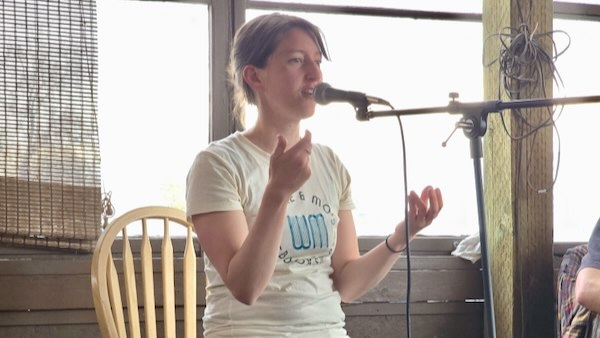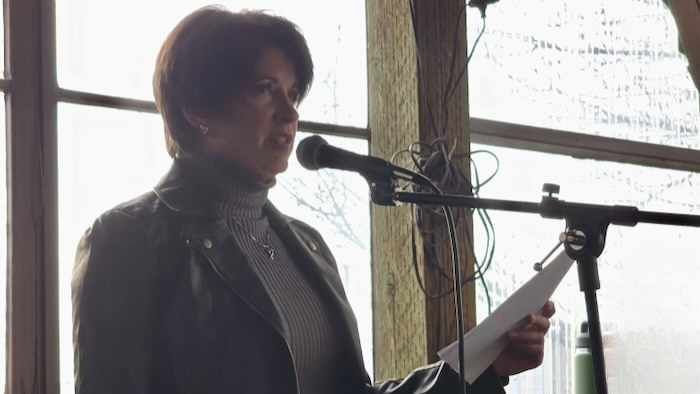As an author, one of the things you may be expected to do is an author reading.
This is where a group of people gather to hear you (and perhaps some other authors) read from your work. It’s your chance to connect with new readers who may go on to become fans.
I recently took part in an author reading that involved three other authors. It was a fun experience and I learned some things that I’ll take forward into my next reading.
1. Keep Your Bio Succinct
Typically, someone will introduce you. And most of the time, they’ll ask you to provide a bio they can read.
It’s best to keep this bio succinct, but that doesn’t mean you have to shortchange yourself. Feel free to briefly talk about any of your writing accomplishments. About 150 words is a good ballpark length.
You probably don’t want to start with something like this though: “When Colleen was 10 years old, she started writing in her journal.” That may work if you move very quickly into the present, but you have to be careful.
Starting back when you were a child can make your audience feel like this is going to be a long and tedious story, and they may tune out before you even take the mic.
Be careful, too, not to use a lot of jargon. If you have a day job that involves technical descriptors your audience isn’t going to understand and you include those in your bio, it won’t impress them. Instead, it will go over their heads and lead them to direct their attention elsewhere.
Keep it simple and relatable.
Author Reading Tip 2. Put Something Personal In Your Bio
You can make it easy on yourself by adding something personal to the end of the bio.
“Colleen plays French horn in the local symphony,” is one that works well for me. Everyone can relate to music and I can share about the next performance we have coming up and ask everyone to attend.
You can share anything that you think your audience will relate to. It could even have something to do with the story you’re going to read if you want. This can make a good lead-in to your reading, as you can comment or expand on that personal item before you start.
That gives you an easy and fast way to connect to the attendees. Which leads me to the next suggestion.

3. Connect Before You Read
The attendees have come to the event expecting to hear authors read. But it’s a mistake to go up, grab the mic, and dive immediately into your story. That would be like ignoring the people in front of you.
People are forgiving and may still do their best to pay attention, but if you can connect with them first, you’ll have a better experience.
As an example, at this last reading, I asked the attendees, “By show of hands, how many of you are motorcycle riders?”
I was reading from my book, The Beached Ones, in which the main character is a stunt rider. I then shared the story of when I took a motorcycle class so that I could write authentically from his point of view before I started reading.
It doesn’t have to be complicated. But sharing something relatable as you look out at the audience can help them feel more connected to you.
Author Reading Tip 4. Stick To The Time Limit
Most likely, you’ll have a set time limit you’re given to read. Shave a couple of minutes off of that. It’s always better to be short than too long. Remember that people have short attention spans!
In my case, I had 15 minutes. I timed it to a little under 14, and that included my opening “connection” story. It worked out well at the reading, but in the future, I’ll be sure to go at least two minutes under.
What I didn’t expect was a Q&A period afterward. The organizer mentioned that right before we started. Because I had timed it so carefully, there was little time for that when I was done. I’ll do better next time!
5. Choose Your Reading Section Carefully
This was the hardest part of the event, in my opinion. What section of your book should you read?
I think if you write mystery, romance, or thriller, it may be a little easier, as your story likely takes place in the real world. Your audience will be at least a little familiar with your setting and how your world works.
If you, like me, write fantasy or science fiction, it’s a little harder. We build our worlds in the reader’s imagination, scene by scene. Often, things are different than they are in the real world, but you don’t have time to explain much before you start.
Yes, you can set up your scene, as long as you can do it in a sentence or two. Longer than that and you’ll lose their attention.
I found that the scenes where two characters were interacting worked the best. Dialogue is often easy to follow, and we become involved in the story when two people are talking.
Long sections of prose without dialogue didn’t seem to work as well. One author read a section that involved a lot of introspection on the part of the main character. I quickly lost interest. You may feel differently, but it’s something to think about.
Author Reading Tip 6. Practice Your Reading!
This is extremely important, and one step many authors miss. Practice what you’re going to say before you start reading, and practice reading.
This helps you make sure you’re within the time limit, for one, and will also help you see whether you need to make any adjustments.
I did this a few times, recording myself both with a voice recorder and with video. It’s amazing how much hearing a reading back can help. In doing so, I realized that one reading option was better than another—something I wouldn’t have known had I not practiced.
In other words, practicing helped me choose the section I was going to read.
It also helped me feel more confident. I was most nervous about my opening “connection” piece, so practicing that a few times helped me feel ready to share.
7. Set Up Your Section Well
No matter what you’re reading, you’ll want to set it up at least a little. Mention the book title and the genre, then give them a very brief synopsis (like one or two sentences).
Next, it can be helpful to provide any trigger warnings. If the scene you’re going to read includes any cursing or other mature material, warn your audience. Better yet, check with the organizer beforehand to find out if there may be any underage attendees at the event and plan your reading accordingly.
Finally, explain what is happening in the scene you’re going to read.
“In this scene, my main character finds himself in Iowa with no idea how he got there. Last he knew, he was performing in a stunt show, but he can’t remember what happened after that.”
That’s how I set up the scene in The Beached Ones. All you need is “just enough” to orient them to the scene, then let your writing take care of the rest.
Author Reading Tip 8. Speak Clearly and Calmly
We had a microphone at this event, which was very helpful. Three of the authors did a great job using it, but one sat too far back from it, so that individual was a lot harder to hear.
If you are supplied a mic at your event, speak clearly into it so you can hear yourself through the speakers. If you don’t have a mic, speak up and project your voice toward the back of the room.
Then, make sure you don’t read too fast. This is an easy mistake when we’re feeling nervous or anxious. Purposely slow down and enunciate your words. Be expressive, as well. That helps make the reading more interesting. Avoid, for example, speaking in a monotone voice.
9. Talk To People
Above all, an author reading is a networking event. This is your chance to meet readers and potentially other writers, as well.
So don’t be shy. Introduce yourself to people both before and after the event. If people buy your book and come to have it signed, take the opportunity to talk with them. Find out what they like to read, who their favorite authors are, where they usually get their books—anything. Act interested and the conversation will go from there.
Too many authors simply scratch their names in the books and move on to the next person. If you do that, you’re missing out on an opportunity to make a more lasting connection.
If there are other writers there, you may want to chat with them as well. I made an author connection at my event, and I look forward to interacting with that person again in the future. We writers need to support each other!
10. Don’t Worry Be Happy
Perhaps one of the biggest lessons I took away from this event was this: your readers will find you. Don’t worry too much about the rest.
Particularly if you are part of a multi-author event, not every person will connect with your story. But those who do will find you even if you don’t perform perfectly.
I was surprised at how much the attendees seemed to enjoy the event. People still like being read to—bookish people, anyway! Those who were intrigued by my story and came to talk to me afterward were clearly “my” readers. I could tell when I chatted with them that they were going to enjoy my book.
Other attendees gravitated to the other authors, and that also made sense. Some were younger people, for instance, and they related more to the author who wrote young adult books.
So don’t worry if everyone doesn’t buy a book. Focus on those who do and enjoy connecting. Every little thing we do to get our names and our work out there helps. This event is just one of them.
Prepare carefully, do your best, and then move on to the next item on your “book marketing” list.

